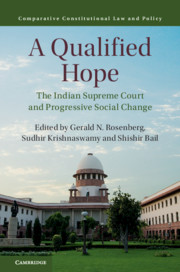Comparative Political Process Theory or Comparative Representative Reinforcement Theory (CPPT/CRRT) is an emerging scholarly field that theorizes about the courts’ role in the broader comparative universe. Considered an intellectual descendent of John Hart Ely’s work in the American context, CPPT/CRRT emphasizes the courts’ role in preventing democratic backsliding, promoting equality, enhancing the efficacy of democratic institutions, fostering deliberative processes, and addressing the failures of majoritarian politics. CPPT/CRRT scholars generally advocate broadening judicial powers and capabilities to fulfill these roles. This article examines the practicality of such judicial responsibilities through the lens of the review of constitutional amendments in India. It concludes that, despite the theoretical aspirations of CPPT/CRRT, courts are unlikely to meet these expectations in practice due to their institutional limitations. The positive outcomes of judicial interventions tend to be more modest than the protective and proactive actions envisioned by CPPT/CRRT proponents. Moreover, the modest benefits also come at the cost of the potential adverse impacts that an empowered judiciary may impose on the constitutional fabric. Consequently, this article suggests a need for recalibration of CPPT/CRRT scholarship wherein its goals are moderated and its aspirational objectives balanced against the potential adverse effects of an empowered judiciary on constitutional systems.
